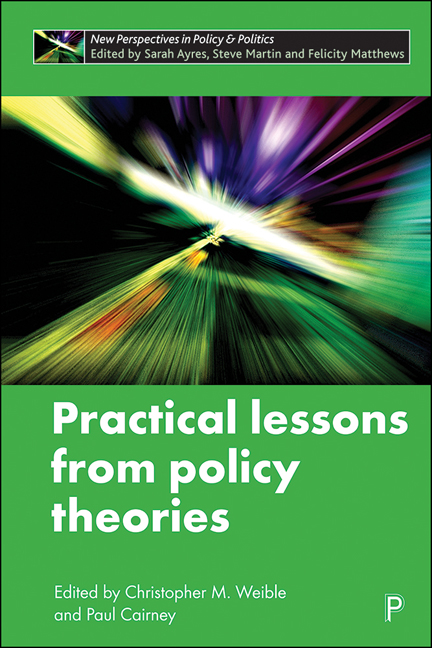Book contents
- Frontmatter
- Contents
- List of figures and tables
- Notes on contributors
- one Purposes and paths in drawing practical lessons from policy theories
- two Three habits of successful policy entrepreneurs
- three Narratives as tools for influencing policy change
- four Using cultural theory to navigate the policy process
- five The lessons of policy learning: types, triggers, hindrances and pathologies
- six Practical prescriptions for governing fragmented governments
- seven Drawing practical lessons from punctuated equilibrium theory
- eight Policy design and the added-value of the institutional analysis development framework
- nine Why advocacy coalitions matter and practical insights about them
- ten Reflections and resolutions in drawing practical lessons from policy theories
- Index
nine - Why advocacy coalitions matter and practical insights about them
Published online by Cambridge University Press: 05 January 2022
- Frontmatter
- Contents
- List of figures and tables
- Notes on contributors
- one Purposes and paths in drawing practical lessons from policy theories
- two Three habits of successful policy entrepreneurs
- three Narratives as tools for influencing policy change
- four Using cultural theory to navigate the policy process
- five The lessons of policy learning: types, triggers, hindrances and pathologies
- six Practical prescriptions for governing fragmented governments
- seven Drawing practical lessons from punctuated equilibrium theory
- eight Policy design and the added-value of the institutional analysis development framework
- nine Why advocacy coalitions matter and practical insights about them
- ten Reflections and resolutions in drawing practical lessons from policy theories
- Index
Summary
Introduction
People can influence government in a number of ways. For some, elections serve as the principal conduit, whereas for others political party affiliation serves this purpose. People might join an interest group, while others might participate in a social movement. All of these paths have been studied in the varied corpuses of academic literature and have been translated into numerous hands-on textbooks and ‘how-to’ articles that offer recommendations for people wanting to impact decisions and policies (della Porta and Diani, 2006; Cigler and Loomis, 1995). The purpose of this chapter is to focus on another way that people can influence government: ‘advocacy coalitions’; and draw lessons about why they matter and what practical advice can be gleaned from the scholarship about them.
Advocacy coalitions is a term that refers to a type of alliance involving people aligned around a shared policy goal. People associated with the same advocacy coalition have similar ideologies and worldviews and, therefore, wish to change a given policy (concerning health, environmental, or many other issues) in the same direction. The coalition that these people form is an informal network of allies that usually operate against an opposing coalition consisting of other people who advocate for different policy directions. As one coalition tries to outmanoeuvre the other coalition in influencing government, the result is an ongoing game of political oneupmanship of making and unmaking public policies that can last years to decades.
One of the deeper literatures on advocacy coalitions falls under the Advocacy Coalition Framework (ACF), which has supported over 30 years of research and more than 400 publications spanning the globe (Jenkins-Smith et al, 2017). This chapter relies heavily on the ACF literature in drawing lessons about coalitions, but also derives lessons from parallel literatures on policy networks, social movements, political participation and others (Amenta et al, 2010; Knoke et al, 1996; Wright, 1996).
This chapter provides scholars with a different way to think about theory and how to draw practical lessons from it. Along with scholars, audiences for this chapter may also include people actively engaged in politics involving public policy issues or undergraduate or graduate students, who through their courses and readings are learning about various theories of public policy and politics and wondering how – if at all – these theories might matter in a career outside the craft and science of academic theoreticians.
- Type
- Chapter
- Information
- Practical Lessons from Policy Theories , pp. 173 - 196Publisher: Bristol University PressPrint publication year: 2021

